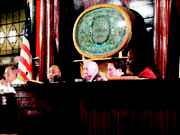Members of the Jersey City Municipal Council began budget hearings Tuesday with departments who have submitted their budgets to make up the total $324 Jersey City municipal budget. The budget covers spending from July, 2002 through June of 2003.
For two days, the council heard from the Department of Public Works and the Public Library.
The Department of Public Works saw an increase in its 2003 budget by approximately $100,000, going from $11,531,575 in 2002 to $11,746,190 this year.
Municipal Engineer Jerry Nissen said that there was an increase in salaries for engineers to make the total $275,000, including a contract with the Municipal Utilities Authority for $34,000 for engineering services. Nissen added that the city is eventually reimbursed by the MUA for the latter.
Nissen said that the city plans to hire more civil engineers, as the Public Works staff had been diminished by attrition and buyouts in previous years. Nissen added that a new Civil Service list had been issued for civil engineers and that he hopes to add nine people to the staff from the list.
“The salaries have to be enough to attract the right people,” said Nissen. “With the downturn in the economy, there are fewer opportunities in the private sector. With that downturn, hopefully we will be able to fill our spots.”
The architecture division of the public works budget saw its own proposed spending plan shrink from $419,850 last year to $360,000 in 2003. Chief Architect Robert Serchio said his department had been running on one architect.
“The department is working on one major project at a time in the city,” said Serchio. “We are also working on other, ongoing projects.”
Serchio stated he would like to make some hires in the future to help with the increased workload of examining buildings being constructed in Jersey City.
At the hearing, Council President L. Harvey Smith suggested that the employment of interns from colleges and universities might be utilized. Serchio said such a plan had limited applications.
“Interns worked well when we had more than one senior architect,” said Serchio. “The senior architects were able to supervise the interns. Right now, I’m the only senior architect.”
Councilman Mariano Vega said they should look into contracting out work by the different divisions of the DPW.
“The key to success with contracting out work is management,” said Vega, who is also the Hudson County director of public resources. “We have done both at the county, and it depends on how the works are managed.”
Vega added that a survey of the cost-effectiveness of outsourcing some municipal street work should be conducted.
Betty Outlaw, newly appointed director of public works, said the automotive services division in public works had 24 full time employees, two part-timers and a salary budget of $920,000 for 2003. This is up from $864,000 last year. Vega again raised the question of outsourcing, in this case, leasing diesel vehicle engineers.
“The city could save between 20 and 30 percent on outsourcing for these services,” Vega stated.
Library budget
The Public Library is looking at a budget of $6.5 million this year, down from $7 million in 2002, according to library director Priscilla Gardner. Gardener added that the library had received a grant from the Bill Gates Foundation of $200,000 to install six computers in each branch of the public library, but the library would have to pay for installation. As a cost-cutting measure, the library has stopped buying books for the rest of the fiscal year.
Smith urged the library and other city departments look into independent fundraising efforts since the city was tightening its belt.
Smith said the council would next hear from the department Health Services, the Law Department and the Parking Authority about their budgets. These hearings will likely be conducted by the end of month or early in February.
Speaking on the need for increased revenue in the budget as a whole due to a shortfall in expected Distressed Cities Aid from the state and unpaid health insurance bills totaling $1.9 million, Smith suggested the temporary imposition of a payroll tax. This would mean that city workers have an additional amount of their salaries taken out for revenue in the city budget.
“The city has a need for a repeating source of income,” said Smith. “It is distasteful to put in a payroll tax, but if we have to raise taxes in this city, it is best to have a mechanism for lowering them.” Once there was an increase of other revenues, Smith explained, the payroll tax could be ended.
